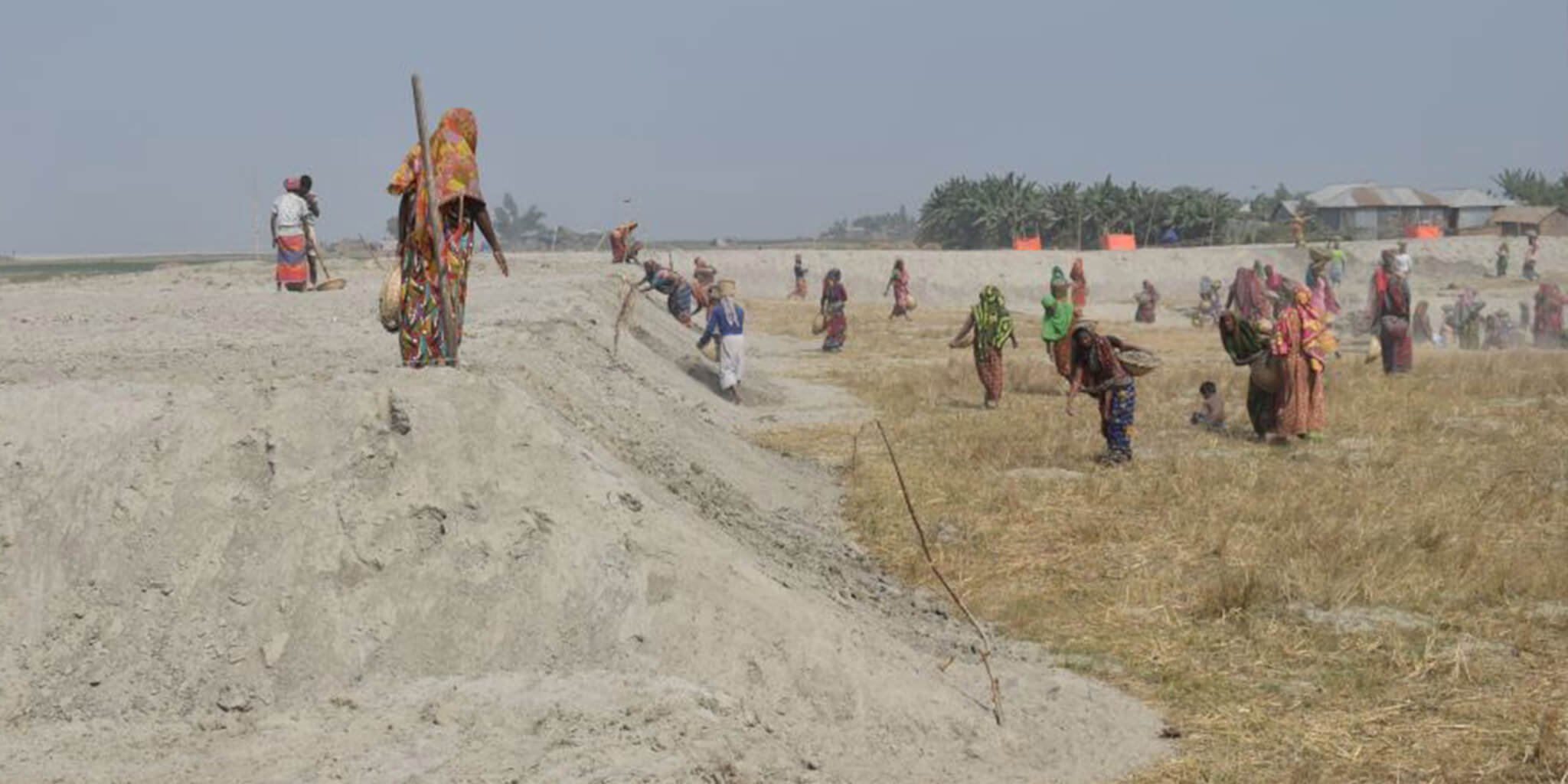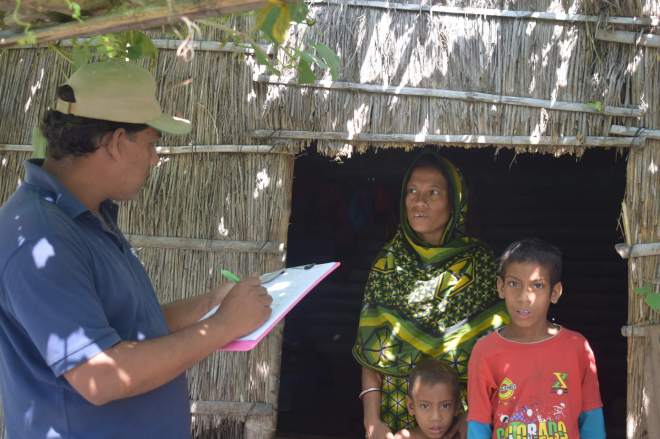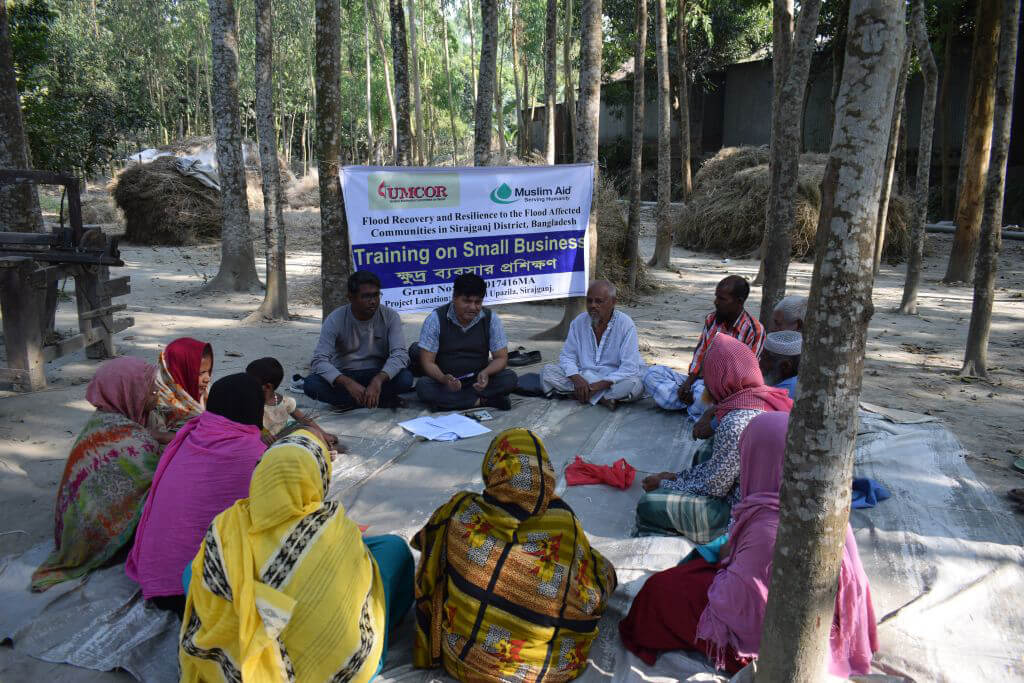
By Christie R. House
March 2020 | ATLANTA
Rubia, who lives in the Jamuna River valley of Omarpur, Bangladesh, has four children; her eldest is 14 and her youngest is an infant. She was able to care for her family when her husband lived at home, but then he took a second wife and moved out. The small amount of money he sends to Rubia does not cover the family’s needs, so she sought work as a day laborer. During the annual flood season, most day workers lose their jobs until the flooding recedes. In 2018, the flood stage was high and lasted longer than usual. Rubia lost her work and then her home, her only asset, in the flooding.
A long-time partner of the United Methodist Committee on Relief (UMCOR), Muslim Aid/UK, has worked for years on flood recovery and mitigation in Sirajganj District, which includes Omarpur and neighboring Chowhali Upazila. A $500,000 grant from UMCOR enabled Muslim Aid to implement its Flood Recovery and Resilience project, reaching vulnerable families, like Rubia’s, and helping them with livelihood and business training, shelter building, cash for immediate relief, cash for working on community projects and funds to invest in livelihood options that are more reliable than seasonal work for hire.
Muslim Aid/UK works within community networks and cooperates with government efforts. Through community consultations using household surveys, Rubia was recommended by her own community to participate in the project. She decided to raise goats as her livelihood venture, and she also received cash for working on community projects. Her family survived the 2018 and 2019 floods. They look forward to raising their goats for their use and for family income.
Seasonal flooding periods extend in Bangladesh
Year after year, flooding has increased in Bangladesh, extending beyond its customary season. Over the last 30 years, Chowhali Upazila residents along the Jamuna River have lost 85 % of their land. (https://www.thedailystar.net/backpage/chowhali-all-gone-1588906) River erosion carved the land down to its current 11.5 square miles from 81 square miles in 1998. Families over a generation have lost their lands, homesteads and livelihoods to river erosion.

PHOTO: MUSLIM AID/UK
The UMCOR-Muslim Aid project had to delay its start by four months in 2018 because of monsoon rains. Approximately 80% of the target area remained under water from May to September. Once the flood project got underway, the project ultimately reached 1,500 beneficiaries – 500 with shelter assistance and 1,000 with livelihood options.
The Muslim Aid/UK and UMCOR partnership offers an array of recovery projects, including village cluster sites built up on raised earth, solar lights for new and refurbished housing, and Water, Sanitation and Hygiene (WASH) projects like flood-resistant tube well-building and water testing. The soil in Sirajganj District has a naturally occurring arsenic component, which must be managed in well digging and planning.
Muslim Aid organizes many focus group discussions with community groups of every kind to help them discern the directions they’d like to take within their communities, such as which projects to build and who will receive benefits. It also hosts training groups on the ground for men and women to learn about the wells, the options for livelihood ventures, hydroponic fodder production when flooded land cannot be cultivated and how to build flood-resistant emergency shelters.
For each community well that is dug, a committee of five, men and women, are trained to maintain it. For each emergency shelter, a community committee forms for shelter coordination and emergency training. Working so deeply within their target communities, Muslim Aid staff learn more about the needs of residents and what to do next. During this round of the grant, they learned that their WASH planning didn’t go far enough. A future effort will plan for more community sanitation and latrine projects.
“I will keep my supporters in my prayers.”
Fojila decided to buy four sheep with her livelihood grant. She could have gotten a sewing machine to start a business as a tailor, or a cow for milk. But for two years, she’s been the only income earner for her family of three. She knows the hard labor of a day worker. She and her husband and 13-year-old daughter live in Chowhali Upazila. Her husband struggles with a chronic illness and can no longer work. But her plan is to keep her daughter in school, throughout her secondary education.

PHOTO: MUSLIM AID/UK
As a beneficiary in the Flood Recovery and Resilience project, Fojila attended the livelihoods alternative training sessions with other women in her community. She decided that sheep raising was the best option for her, considering her work experience and her own preference.
A Muslim Aid/UK worker visited her home to follow-up on her livelihood choice. When he asked about how her family was doing with sheep-raising and whether she received enough training and support, she started to cry.
“I am so very happy,” said Fojila. “My husband is ill and cannot work, but now I have these sheep to help me earn an income and support my family. I keep those who supported me with this grant in my prayers.”
Christie R. House is a writer and editor consultant with Global Ministries.

